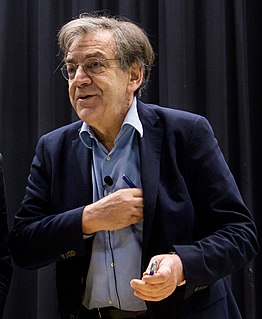A Quote by Mahatma Gandhi
It is man's social nature which distinguishes him from the brute creation. If it is his privilege to be independent, it is equally his duty to be inter-dependent. Only an arrogant man will claim to be independent of everybody else and be self-contained.
Related Quotes
A good soldier is a blind, heartless, soulless, murderous machine. He is not a man. His is not a brute, for brutes kill only in self defense. All that is human in him, all that is divine in him, all that constitutes the man has been sworn away when he took the enlistment roll. His mind, his conscience, aye, his very soul, are in the keeping of his officer. No man can fall lower than a soldier-it is a depth beneath which we cannot go.
No man is an island- he is a holon. A Janus-faced entity who, looking inward, sees himself as a self-contained unique whole, looking outward as a dependent part. His self-assertive tendency is the dynamic manifestation of his unique wholeness, his autonomy and independence as a holon. Its equally universal antagonist, the integrative tendency, expresses his dependence on the larger whole to which he belongs: his 'part-ness.'.
God, Who is by nature good and dispassionate, loves all men equally as His handiwork. But He glorifies the virtuous man because in his will he is united to God. At the same time, in His goodness he is merciful to the sinner and by chastising him in this life brings him back to the path of virtue. Similarly, a man of good and dispassionate judgment also loves all men equally. He loves the virtuous man because of his nature and the probity of his intention; and he loves the sinner, too, because of his nature and because in his compassion he pities him for foolishly stumbling in darkness.
Each man is contained and constrained, on entering social life, to fit his own life in, just as he fits his words and thoughts into a language that was formed without and before him and which is impervious to his power. Entering the game, as it were, whether of belonging to a nation or of using a language, a man enters arrangements which it does not fall to him to determine, but only to learn and respect the rules.
Man has reason, discrimination and free-will such as it is. The brute has no such thing. It is not a free agent, and knows no distinction between virtue and vice, good and evil. Man, being a free agent, knows these distinctions, and when he follows his higher nature, shows himself far superior to the brute, but when he follows his baser nature can show himself lower than the brute.
Man is the only animal who does not feel at home in nature, who can feel evicted from paradise, the only animal for whom his own existence is a problem that he has to solve and from which he cannot escape. He cannot go back to the prehuman state of harmony with nature, and he does not know where he will arrive if he goes forward. Man's existential contradiction results in a state of constant disequilibrium. This disequilibrium distinguishes him from the animal, which lives, as it were, in harmony with nature.
The poet's, the writer's, duty is to write about these things. It is his privilege to help man endure by lifting his heart, by reminding him of the courage and honor and hope and pride and compassion and pity and sacrifice which have been the glory of his past. The poet's voice need not merely be the record of man, it can be one of the props, the pillars to help him endure and prevail.
In the present age, man proves his separation from his Creator by his spirit of self-sufficienc y and positive rejection of God. The present issue between God and man is one of whether man will accept God's estimate of him, abandon his hopeless self-struggle, and cast himself only on God who alone is sufficient to accomplish his needed transformation.







































